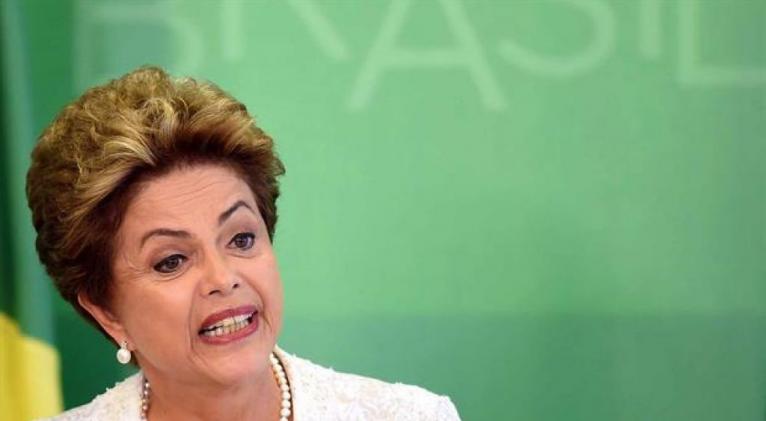Brazil Lower House Speaker OKs Impeachment Proceedings against Rousseff
especiales

 BRASILIA – The speaker of Brazil’s lower house of Congress on Wednesday authorized the opening of impeachment proceedings against Brazilian President Dilma Rousseff, accepting a petition that accused her of fiscal irregularities in 2015.
BRASILIA – The speaker of Brazil’s lower house of Congress on Wednesday authorized the opening of impeachment proceedings against Brazilian President Dilma Rousseff, accepting a petition that accused her of fiscal irregularities in 2015.
Eduardo Cunha, an outspoken critic of Rousseff’s who is facing bribery charges in connection with a massive graft scandal centered on state-controlled oil company Petrobras, said he regretted taking this step against the head of state, particularly at a time when Brazil faces a political crisis and is mired in recession.
“I’m not doing this for political reasons and I’d reject (the accusation) if it were not in keeping with the law,” the speaker, a leader of the centrist Brazilian Democratic Movement Party, or PMDB, said.
The PMDB is an ally of Rousseff’s center-left Workers Party, or PT, but Cunha broke with the ruling coalition in September.
He said he had rejected 27 of the 34 impeachment requests he had received after deeming them either unlawful or based on allegations of wrongdoing stemming from Rousseff’s first term in office, which ended last December.
The petition accepted by Cunha accuses Rousseff of breaking Brazil’s fiscal responsibility law by approving a series of irregular accounting maneuvers aimed at shoring up last year’s fiscal results.
Cunha acknowledged that the petition presented by several jurists, including Helio Bicudo, one of the PT’s founders, included allegations of irregularities committed last year, when Rousseff was narrowly elected to a second four-year term in office, but that its authors had added an annex with accusations of fiscal shenanigans in 2015 as well.
The speaker added that a special commission to be created by the lower house this week would rule on the merits of the accusation and decide whether to authorize an impeachment trial.
Rousseff, for her part, slammed Cunha’s decision and said there was no legal justification for the move.
“I was outraged by the decision of the speaker of the lower house against a democratic mandate conferred by the Brazilian people,” Rousseff said in a brief statement Wednesday at the Planalto presidential palace.
She said Cunha’s grounds for accepting the petition by several jurists and opposition parties “are inconsistent” and not based on “any illegal act.”
“I’m not suspected of diverting public money. I don’t have (hidden) accounts abroad and I didn’t pressure institutions or persons,” Rousseff said in a clear allusion to Cunha, who is implicated in the Petrobras scandal and has been charged with money laundering and corruption related to alleged inflated contracts for drilling rigs.
He denies those accusations and says they are politically motivated.
Cunha announced his decision on the same day the PT said it would support the opening of a process in the lower house’s Ethics Committee that could lead to his removal as speaker.
The top lawmaker faces several allegations related to a massive, decade-old graft scheme centered on Petrobras, and federal prosecutors recently began investigating him for undeclared bank accounts that were discovered abroad and which he is suspected of using to stash money siphoned from Brazil’s largest company.
The scandal involves allegations that suppliers overcharged the oil giant for contracts, splitting the extra money with corrupt Petrobras officials while setting aside some of the loot to pay off politicians who provided cover for the graft.
The state-controlled oil company released a financial statement earlier this year acknowledging the diversion of some $2 billion over a decade.
Dozens of lawmakers, most of them members of the ruling coalition, have been implicated, while the CEO of Brazilian engineering giant Odebrecht is among those charged in the case with corruption and money laundering.
But Rousseff, who chaired Petrobras from 2003 to 2010, when much of the alleged corruption took place, has not been accused in connection with the graft scheme.













Add new comment